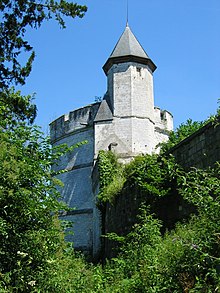Robert Despenser (sometimes Robert Despensator,[1] Robert Dispenser,[2] or Robert fitzThurstin;[3] died after 1098) was a Norman officeholder and landholder in post-Conquest medieval England.
Robert Despenser | |
|---|---|
 The Château de Tancarville in Normandy. Despenser was a tenant of the lords of Tancarville. | |
| Royal steward | |
| In office c. 1088 – c. 1098 | |
| Preceded by | none |
| Personal details | |
| Born | unknown - before 1066 Normandy |
| Died | c. 1098 England |
Career
editDespenser was the brother of Urse d'Abetot, who was sheriff of Worcestershire shortly after the Conquest.[1] Despenser and his brother were originally from Normandy, and were tenants of the lords of Tancarville there.[3] Despenser held the office of royal steward, or dispenser, under King William II.[1] Despenser's surname derived from his office.[4][note 1] Although Despenser was married, the name of his wife is not known for sure. He may be the Robert de Abitot referred to in a confirmation charter of King Stephen of England's, but this identification is not certain.[1]
In 1086, Despenser was listed in Domesday Book as holding lands as a tenant-in-chief in Gloucestershire, Leicestershire, Lincolnshire, Oxfordshire, and Warwickshire, as well as holding lands in Worcestershire from the Bishop of Worcester.[3]
Robert was still alive in 1098, as he restored some estates to Westminster Abbey,[3] but likely died shortly thereafter.[4] In Normandy, Robert was a benefactor to the Priory of St. Barbe-en-Auge, which had been founded by the Tancarville lords.[6]
Legacy
editDespenser appears to have had no legitimate male children, as his heir was his brother Urse.[1] He may have had a daughter, as some of his lands were inherited by the Marmion family, but it is also possible that they acquired the lands via marriage with a daughter of Urse.[4] Despenser's office as steward may also have gone to Urse, as later the office passed to Urse's heirs.[3] The medieval writer Orderic Vitalis states that it was Despenser who gave Ranulf Flambard his surname of Flambard, which means torch-bearer or incendiary. This was applied to Flambard because of his overwhelming personality.[2]
Notes
editCitations
edit- ^ a b c d e Keats-Rohan Domesday People p. 383
- ^ a b Mason William II p. 75
- ^ a b c d e Barlow William Rufus pp. 141–142
- ^ a b c Round "Abetot, Urse d' (c.1040–1108)" Oxford Dictionary of National Biography
- ^ Reaney and Wilson Oxford Dictionary of English Surnames p. 420
- ^ Newman Anglo-Norman Nobility p. 150
Sources
edit- Barlow, Frank (1983). William Rufus. Berkeley, CA: University of California Press. ISBN 0-520-04936-5.
- Keats-Rohan, K. S. B. (1999). Domesday People: A Prosopography of Persons Occurring in English Documents, 1066–1166: Domesday Book. Ipswich, UK: Boydell Press. ISBN 0-85115-722-X.
- Mason, Emma (2005). William II: Rufus, the Red King. Stroud, UK: Tempus. ISBN 0-7524-3528-0.
- Newman, Charlotte A. (1988). The Anglo-Norman Nobility in the Reign of Henry I: The Second Generation. Philadelphia, PA: University of Pennsylvania Press. ISBN 0-8122-8138-1.
- Reaney, Percy H. & Wilson, Richard M. (2005). Oxford Dictionary of English Surnames (Third ed.). Oxford, UK: Oxford University Press. ISBN 978-0-19-280663-5.
- Round, J. H. (2004). "Abetot, Urse d' (c.1040–1108)". Oxford Dictionary of National Biography. revised by Emma Mason. Oxford University Press. doi:10.1093/ref:odnb/28022. Retrieved 13 June 2009. (subscription or UK public library membership required)